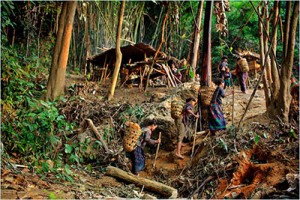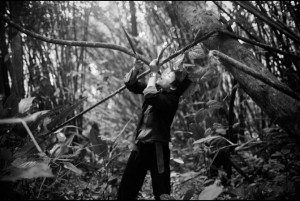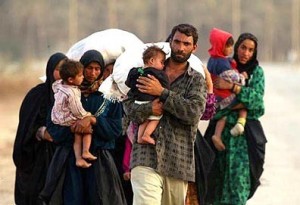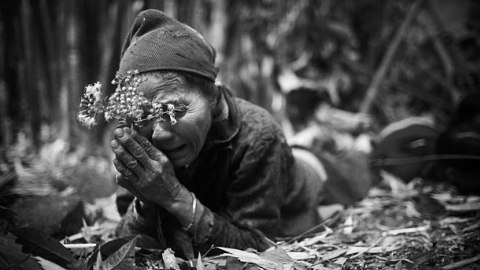Seven Asian young men, dripping wet from just having been in the creek, walk slowly along the narrow path that parallels the stream. I’ve never been to Southeast Asia, but for a moment I feel as though I’ve been transported there, walking slowly behind a line of people along a narrow path.
 I soon catch up to the young fellows, who slow my progress. They are a voluble bunch, talking seemingly all at once, in a language I’ve never heard. The last fellow, a stout teen in knee-length shorts and squishing rubber sandals, turns and says, “Sorry.” His pitch, timing, and inflection indicate a complete command of English.
I soon catch up to the young fellows, who slow my progress. They are a voluble bunch, talking seemingly all at once, in a language I’ve never heard. The last fellow, a stout teen in knee-length shorts and squishing rubber sandals, turns and says, “Sorry.” His pitch, timing, and inflection indicate a complete command of English.
In the ways the young men are dressed, and the last fellow’s nearly monosyllabic replies, the overlay is definitely American. But the teenagers evoke an ancient culture in the language they speak. All languages carry subconscious cultural memories in the minds of their speakers.
“No problem,” I reply, using a colloquialism, rather absurdly adding, “You’ve all just been in the creek?” “Yeah,” he says, the word dripping with an unspoken, ‘Obviously.’
My curiosity isn’t deterred by his diffidence. “Where are you from?” I ask. “Oroville,” he says comically, referring to a town 20 minutes from here. Not sure whether he’s putting me on, I persist: “I mean originally.” “Laos,” he says.
Now it’s my turn for a one-word response: “Hmong?” “Yes,” he replies, at which they all turn around in unison.
In terms of recent history, the CIA recruited the Hmong people of Laos in the early years of the Vietnam War to fight the North Vietnamese in Laos. It became known as the “Secret War.” After America’s ignominious defeat and departure from Vietnam, the Hmong faced persecution and retaliation by the communists, which also took over the Lao kingdom.
fight the North Vietnamese in Laos. It became known as the “Secret War.” After America’s ignominious defeat and departure from Vietnam, the Hmong faced persecution and retaliation by the communists, which also took over the Lao kingdom.
Many Hmong refugees fled to Thailand, and in the 1990’s they were forcibly repatriated to Laos, with the support of the Clinton Administration and UNHCR. Under growing pressure, Clinton relented, and allowed many Hmong to immigrate to America. A sizable number settled in the Central Valley of California.
After the debacle of Iraq, the United States is faced with a similar long-term moral dilemma. Certainly, the Bushes’ Vietnam (father and son—Iraq) will haunt America, and the world, for decades.
Millions of Iraqis have fled their homeland, but less than 10,000 have been allowed into the United States, despite the fact that many worked for us, and we caused the open wound on the human psyche that Iraq has become.
As the Center for American Progress says, with unintended understatement, “Despite its role in the conflict, the United States has allowed less than 6,000 of the more than 4 million Iraqi refugees to resettle on American soil.”
The reason so few are being admitted is because to do so would be an admission of failure and defeat in Iraq.
The lesson of Iraq is not only the tired cliché that those who refuse to study and learn from the past are condemned to repeat it. The larger issue is how much, and how little, the world has changed.
 The numbers and problems of refugees around the world are exponentially increasing. But in a deeper sense, we’ve all become refugees in a dislocated world of real and wrenching physical threats, driven by hyped psychological fears. The words of a physician in Baghdad reverberate around the world: “The air has become poisoned by sectarianism, and we have all been breathing it.”
The numbers and problems of refugees around the world are exponentially increasing. But in a deeper sense, we’ve all become refugees in a dislocated world of real and wrenching physical threats, driven by hyped psychological fears. The words of a physician in Baghdad reverberate around the world: “The air has become poisoned by sectarianism, and we have all been breathing it.”
What is the value of identification with particular groups as a primary source of one’s identity, when all that’s left of once geographically distinct cultures are fragments scattered in many lands, and ‘homelands?’
The meaning of the word ‘primitive’ now is: Clinging to ‘my group,’ ‘my country’ and ‘my religion’ as the world grows more and more interconnected, everyone crammed together onto the sinking ship of a once spacious earth.
In terms of the rivers and floods of refugees fleeing war, or seeking a better life (or simply survival), the international community has to take a global approach to come to terms with the problem. Otherwise, in the foreseeable future, the world will be divided between those within fortresses, and those trying to slip or break in. In many ways, it already is.
On the spiritual level, hasn’t everyone become a refugee, unmoored from crumbling cultures and traditions, increasingly disconnected from our fragmented and overtaxed earth?
Where does one take refuge in a rampantly materialistic, consumeristic global culture laying waste to every land and every spirit? Not in a specific land, but the earth itself. Not in a particular country or ethnic group, but humanity as a whole.
Martin LeFevre

